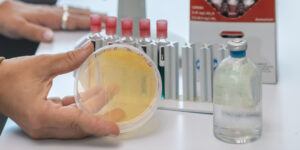Biocementation combines biology and engineering.
At Medusoil, we apply a biocementation microbial process where ammonia-fed microorganisms trigger mineral precipitation, forming organic binders that stabilize soils sustainably.
You may know the world depends on four essential materials: steel, concrete, plastic, and ammonia (source: TIME Magazine).
While the first three dominate the construction industry, the fourth : ammonia, hides remarkable potential beyond agriculture and food production.
At Medusoil, we tap into this potential through biocementation, a process where microorganisms use ammonia to trigger natural mineral precipitation.
These biologically formed minerals act as organic binders, replacing synthetic or mined binding agents in construction.
This is what makes our approach truly “bio”.
From lab to scale: a new biocementation production plant
Medusoil recently launched an upscaled biocementation production plant, boosting total output from 35,000 liters in 2023 to 200,000 liters in 2024.
The plant runs on a fully circular, zero-waste model that combines microbial efficiency with industrial scalability.
It forms part of our new factory scheduled for completion in July 2024.
This microbial process in biocementation enables fast mineralization under neutral pH conditions.
The plant successfully produced a 1.5-meter prefabricated retaining wall, part of a project on demolition waste valorization.
This milestone demonstrates how biological and industrial processes can work together for sustainable construction.
Key outcomes:
- Streamlined production. Biocementation in prefabricated moulds or encased columns can run in parallel with ammonia valorization in less than 9 hours.
- Circular sustainability. Zero-waste operation with nitrogen recycled for agricultural use after biocementation.
- Water efficiency. 150–200 liters per cubic meter of biocemented elements.
- pH neutrality. Process completes at pH 7–8.
Why “bio” matters in construction materials
By relying on microbial mineralization instead of energy-intensive synthetic chemistry, our binders reduce:
- Need for mined raw materials,
- Carbon footprint of cementation,
- Long-term soil and groundwater disruption.
This biologically driven pathway is not only sustainable, it’s replicable, measurable, and industrially scalable.
Where it helps: from erosion to liquefaction defense
Our organic binders strengthen and stabilize soils across a wide range of geotechnical challenges:
- Soil Reinforcement
- Erosion & Flood Defense
- Soil Depollution
- Swelling / Cracking Defense
- Liquefaction Defense
- Impermeabilization / Crack Sealing
- CO2 Mineralization / Additives
By replacing heavy mechanical stabilization, our binders reduce machinery and labor needs by 20–30% while improving long-term soil performance.
Who We Are:
Medusoil Ltd is at the forefront of innovation in sustainable construction materials, particularly through its pioneering work in organic synthesis of mineral and polymeric binders.
Our patented technologies integrate organic binding agents into our products, marking a departure from traditional synthetic chemistry and mined binding agents.
This shift enhances the environmental footprint of construction projects and supports the industry’s transition towards net-zero goals.
Medusoil’s organic binding agents improve material properties and mitigate risks such as settlements, erosion, or liquefaction while offering substantial cost savings by reducing machinery and labor expenses by 20 to 30 percent.
Our advancements underscore Medusoil’s commitment to driving sustainable development through innovative mineral additives for the construction sector.
Talk to an engineer
Considering soil reinforcement, erosion defense, or liquefaction mitigation with biocementation?
Contact our engineering team: info@medusoil.com or fill our form on our contact page




